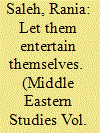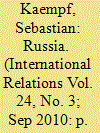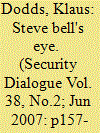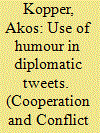|
|
|
Sort Order |
|
|
|
Items / Page
|
|
|
|
|
|
|
| Srl | Item |
| 1 |
ID:
158084


|
|
|
|
|
| Summary/Abstract |
This article examines the issues underlying the downfall of the Mubarak regime from the perspective of Egyptian cartoonists. A total of 2734 political cartoons published in five leading newspapers between January 2010 and February 2011 are analyzed. Because they form a significant part of the cultural context within which these cartoons are created, popular political jokes are also referenced. The study identifies political stagnation, domestic issues and corruption as the three most significant issues that paved the road to the fall of Mubarak.
|
|
|
|
|
|
|
|
|
|
|
|
|
|
|
|
| 2 |
ID:
183378


|
|
|
|
|
| Summary/Abstract |
This article focuses on cartoons published by the magazine Molla Nasreddin between 1906 and 1931, which enjoyed a wide diffusion throughout the Muslim world. These cartoons focused on antiquity, pointing particularly to Egypt and Iran’s pre-Islamic past, as the centre of a political discourse and major elements to encourage resistance, identity, independence and legitimacy against European colonialism, revealing itself as an original and interesting approach, since antiquity was just beginning to be a political reference in those countries.
|
|
|
|
|
|
|
|
|
|
|
|
|
|
|
|
| 3 |
ID:
099800


|
|
|
|
|
| Publication |
2010.
|
| Summary/Abstract |
Outlining the century-old debates about 'What is Russia?', this article - by drawing on a variety of sources such as fiction, culture, cartoons and identity - shows how Russian and Western answers to this question have impacted on each other. To do so, the article first examines the extent to which Russian society - ever since the Mongolian Yoke - has been culturally torn between Westerniser and anti-Westerniser positions. It then complements the insights into Russia's self-reflective identity formation in two ways: by illustrating how Russia, in the West, has become portrayed as a caricature of the Western consciousness and by demonstrating how the Russian 'Self', in return, has been defined through the prism of Western expectations.
|
|
|
|
|
|
|
|
|
|
|
|
|
|
|
|
| 4 |
ID:
077350


|
|
|
|
|
| Publication |
2007.
|
| Summary/Abstract |
This article explores the geopolitical representations of British cartoonist Steve Bell. The Bush administration's so-called `War on Terror' provides a political and visual backdrop to a detailed analysis of a number of Bell's editorial cartoons in the British newspaper The Guardian, as well as an interview conducted with the artist. As with cartoonists in the past, Bell's work seeks to provide a contemporary view of events in a manner that calls into question dominant practices and representations, such as the USA's `War on Terror'. This article is intended to further contribute to the necessary debate on how visual images and technologies are put to work for the purpose of making sense of the geopolitical world around us.
|
|
|
|
|
|
|
|
|
|
|
|
|
|
|
|
| 5 |
ID:
181534


|
|
|
|
|
| Summary/Abstract |
Today diplomacy increasingly relies on tweets. Yet, as tweets only allow for 280 characters, statements must be brief and impactful, which encourages the use of humour in conveying one’s message. This article scrutinizes irony and ridicule in diplomatic interactions. Even though these forms of humour may antagonize parties and even turn issues into a security concern, this article points out that they also have an affiliative aspect and could play a conflict-mediating role. Because humour, especially irony, is easy to misunderstand (especially in cross-cultural settings), many warn against using them in diplomatic exchanges. Nevertheless, I will argue that they are ideal for expressing multi-layered messages, enabling the speaker to rely on what is often called ‘constructive ambiguity’, which is often useful in diplomatic conduct. Two case studies illustrate the argument. The first focuses on cartoons ridiculing President Wilson in the early 20th century for his reluctance to commit the US to join WWI (suggesting that cartoons of the time might be predecessors of today’s tweets), and the second on tweets published by the British Embassy in London apropos of the Skripal case (offering an example how humorous tweets can convey multi-layered, complex messages).
|
|
|
|
|
|
|
|
|
|
|
|
|
|
|
|
|
|
|
|
|